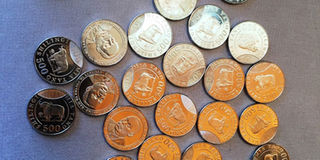Bank of Tanzania explains why shilling is volatile in January

What you need to know:
- Bank of Tanzania (BoT) has revealed that the depreciation of the local currency during the first month of this year is caused by the increased demand for dollar and low exports season.
Dar es Salaam. The Tanzanian shilling has remained volatile this month after recording continuous depreciation against the dollar.
The Bank of Tanzania (BOT) foreign exchange rates showed the shilling being sold at Sh2,294 and bought at Sh2,271 yesterday as compared to buying rates of Sh2,249 and Sh2,227 recorded on January 29, 2018.
The interbank foreign exchange market report has also shown that the dollar was exchanged at a mean rate of Sh2,294.41 on Friday last week from Sh2,249 recorded on January 29 last year.
Bureaux de change sold the shilling at the maximum rate of Sh2,385 yesterday, up from the Sh2,256 recorded in January last year.
Analysts say the depreciation of the local currency was a result of both local and external factors, ranging from the appreciation of the dollar against other major currencies as well as increased imports, which overweighed the foreign exchange earnings from exports of goods and services.
Commenting on the situation, the BoT director of economic research and policy Dr Suleiman Misango, told The Citizen that during the months of December and January the shilling has a tendency of both depreciating and appreciating against the dollar.
“Normally during the month of December it appreciates, but in January there is a high demand, as corporates and individuals seek foreign currency to meet year end related activities,” he said.
He noted that other factors that lead to the depreciation included January being a low season for exports and tourism.
According to him, things will change soon when tourism and export seasons pick up thereby bringing in foreign exchange.
Another analyst attributed the situation to the suspension of cashew nuts exports, saying it has also denied exports earning during the end of last year, thus affecting the balance of payment and foreign currency availability.
Last year, the country earned a total of $575 million (Sh1.3 trillion) from cashew exports, which automatically enabled strengthening of the shilling due to increased dollar availability in the market.




